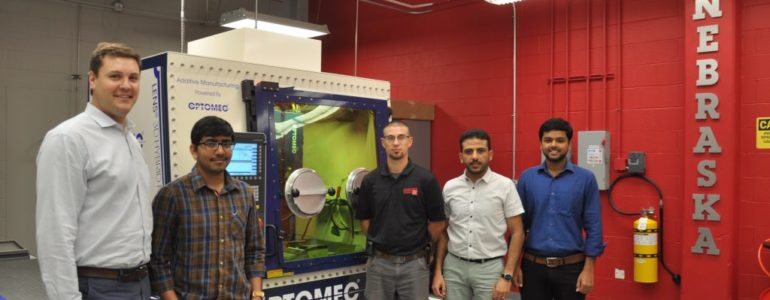23/10/18

At IMTS 2018; this week metal 3D printing provider Optomec, from Albuquerque, New Mexico, released the LENS 860 Hybrid Controlled Atmosphere (CA) System which is capable of working with reactive metals like magnesium.
Tipped to be the first of its kind in the industry, the LENS 860 has already found valuable applications in the medical industry. With early access to the system, a team of researchers at the University of Nebraska-Lincoln (UNL) have started developing 3D printed implants containing dissolving magnesium components.
“We are proud to be the first customer of an Optomec LENS Hybrid Controlled Atmosphere System, the only commercially-available machine to provide hybrid manufacturing capabilities for reactive metals,” comments Dr. Michael Sealy, Assistant Professor of Mechanical and Materials Engineering at UNL.
“OUR RESEARCH IS FOCUSED ON ADVANCING THE PERFORMANCE AND FUNCTIONALITY OF DISSOLVABLE DEVICES. USING LENS, WE ARE APPLYING A HYBRID ADDITIVE MANUFACTURING PROCESS TO CONTROL THE DISINTEGRATION OF MEDICAL FASTENERS AND PLATES SO THEY STAY IN-TACT LONG ENOUGH TO SERVE THEIR PURPOSE AND THEN DEGRADE AWAY ONCE THE BONE IS HEALED.”
Patient-specific medical implants are a key development in the application of 3D printing for medicine. In many cases 3D printed devices are applied to uncommon injuries to help improve patient comfort. They are also prolific in the spinal device sector, and for maxillofacial operations.
The design freedom allowed by additive manufacturing is giving practitioners new avenues for improving the way the body heals and interacts with an implant. Lattice structures in particular have been noted for their ability to promote bone in-growth through a supportive implant.
The UNL research works at the next stage of the implant’s purpose. Once an implant has helped broken bones grow back together, a second operation is usually required to remove it. By making an implant that gradually dissolves, the researchers hope to overcome the risks associated with further operations, and help the body heal in a more natural way.
The challenge in making a dissolving implant is sustaining its strength for long enough to complete the task at hand. With the Lens Hybrid CA System, Dr. Sealy and the UNL team can combine LENS metal deposition with successive surface treatments that control the degradation of the implant’s magnesium content.
The process is achieved in a 860 x 600 x 610mm, hermetically-sealed build chamber that maintains oxygen and moisture levels below 10 parts per million – the value required for processing reactive metals.
In addition laser metal deposition (LMD) additive technology, parts can also be milled within the LENS system to finish.
Want to see the latest system from @OptomecInc? Demo's are taking place in the West building of #IMTS2018. #3dprinting pic.twitter.com/vHrQpDPGsb
— 3D Printing Industry (@3dprintindustry) September 11, 2018
Optomec LENS systems can be added to existing CNC platforms, and is specially suited to metal deposition on to pre-shaped substrates, i.e. curved or ridged components. Dave Ramahi, Optomec president and CEO, explains, “The new LENS 860 suite of systems builds on the success of our Machine Tool Series, first launched at IMTS in 2016,”
“These new larger machines continue to demonstrate our ability to transition Optomec production-proven 3D Metal Printing capability onto traditional CNC platforms that match the cost, performance and ease-of-use demands of the traditional machine tool market.”
The LENS Machine Tool Series has a starting price of $250,000, and first shipments of the LENS 860 are expected within the year. Ramahi concludes:
“THESE PRODUCTS ARE A KEY ELEMENT OF OUR STRATEGY TO BRING METAL ADDITIVE MANUFACTURING INTO THE INDUSTRIAL MAINSTREAM.”